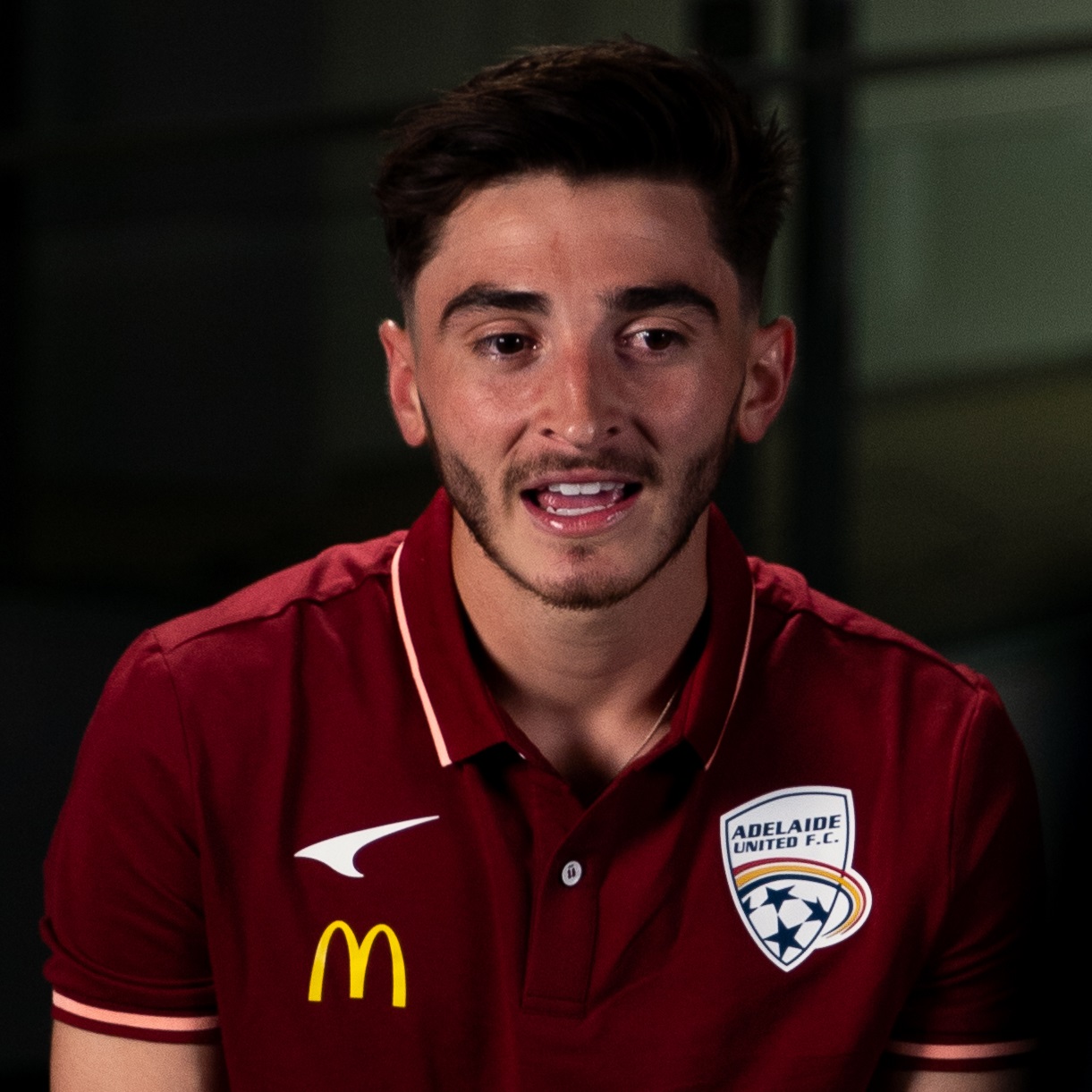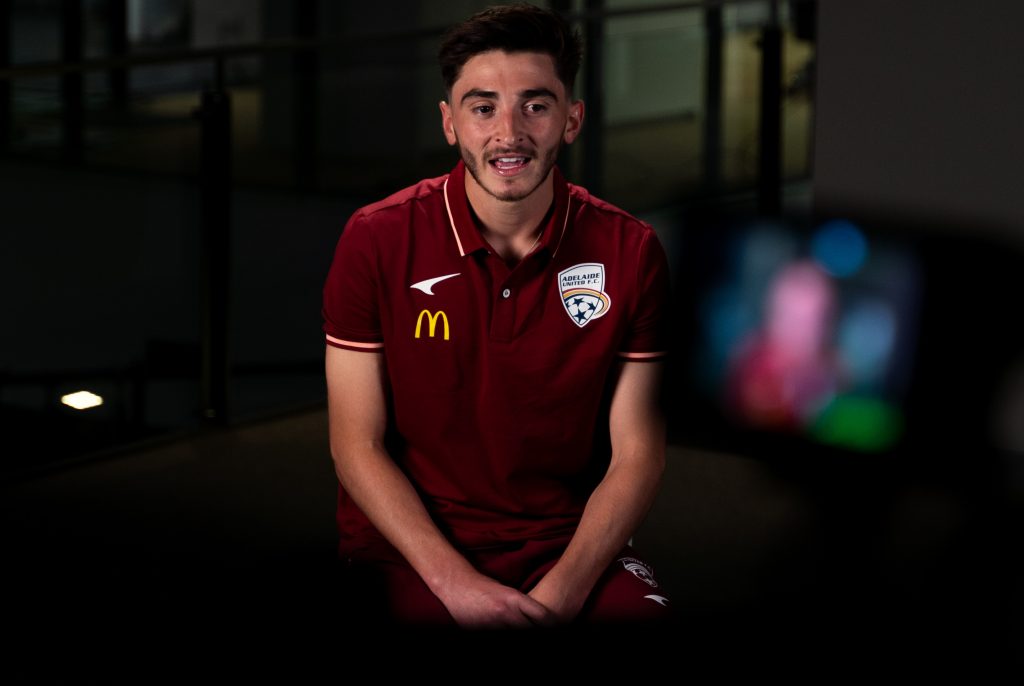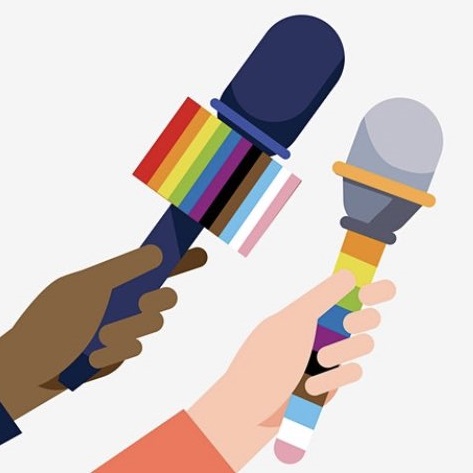Major media impact of Joshua Cavallo’s coming out shows power of storytelling

When a young footballer in Australia saw himself reflected in the story of a former player, he reached out to him for guidance. Six months later, Joshua Cavallo was not just ready to come out publicly, but to share his truth in a way that reverberated across the football world. Jon Holmes looks at the media learnings behind the headlines…
By Jon Holmes, founder and lead of Sports Media LGBT+

Even before Joshua Cavallo introduces himself in his coming out video, there is a moment that really resonates with me.
I’m sure many other LGBTQ+ people who have watched his three-minute film will have felt the same way.
After a nervous, nail-biting gesture, there’s a sharp exhalation of breath as this 21-year-old footballer prepares to become the upgraded version of himself – Josh 2.0, if you will.
It’s Jennifer Garner’s dialogue in Love, Simon – a cultural touchpoint for a vast number of gay men worldwide – played out in real life.
“These last few years, more and more, it’s almost like I can feel you holding your breath… You get to exhale now… You get to be more you than you have been in… in a very long time.”
Emily Spier, Simon’s mother
Just four months ago, Cavallo returned home from the A-League club’s Awards Night having collected the Rising Star gong. “Instead of celebrating, I sat in my bed crying that night,” he wrote in his first-person piece on the Network 10 website.
Now, in his TV interviews, we see a young man who is cheerful and confident. Who could fail to be moved by such a storyline? From Arsenal to Zlatan, FIFA to Ferdinand, Ellen to Lineker, the ripples of respect washed far and wide across social media.
During the day, I sent and received numerous messages with Sports Media LGBT+ colleagues, and other friends from our community in sport. We saw in Josh a kindred spirit. For all of us who have struggled at some point with coming out – to whatever extent – the freeing feeling he displays echoes through our experiences.
It’s universal however we share our truth, whether we are civilian or celebrity, young or old. We finally, fully, allow ourselves to breathe out – and we come out. It might be to just one person, in a whisper. It might be to millions, in a video that goes viral such as Cavallo’s has done.
Unless you’re an Adelaide United fan or A-League aficionado, it’s unlikely you’d heard of him before Wednesday morning. Now his name has top-trended on social media, featured in SEO headlines worldwide, and been added as the 14th entry to Wikipedia’s ‘List of male gay footballers’.
First on that list is Justin Fashanu, who died the year before Cavallo was born. “I remember reading about Justin Fashanu becoming the first male pro footballer to come out in the 1990s, and then eight years later, taking his own life. That did concern me,” writes Cavallo. A Norwich legend, a football icon, a much-loved relative and friend, yet still perceived as the protagonist of a cautionary tale.
Encouragingly, however, it is the account of another English footballer, Thomas Beattie – the penultimate entry on that Wiki list – which has proved to be of greater significance to the young Australian. “He came out in June 2020, and his story touched me,” continues Cavallo. “He was living a life identical to mine.
“Since then, he has become one of my closest friends, and made me feel comfortable to be in my own skin. He is a brother, a friend, a role model, and truly an inspiration for my coming out journey.”
The strength of their bond was evident in Beattie’s congratulatory tweet. Having interviewed the latter for an article for Sky Sports last year, it’s no surprise to me that his advice and guidance has been invaluable to Cavallo.
Beattie is able to articulate so many of the conflicting emotions that a closeted male athlete tends to go through – how your role consumes your identity at the expense of your sexuality, how team-spirit highs can shift towards crushing lows when you’re alone, and how even fleeting interactions with other men (such as a ‘like’ on social media) can cause worry, should someone else witness them and determine a truth that you haven’t yet accepted for yourself.
But when you’re ready to take ownership of who you are – as Cavallo has now done – a sense of clarity descends as the emotional baggage lifts.
You can succeed in life as both a footballer and as a gay man, without compartmentalising; your team-mates and coaches show that their appreciation for you embraces your personality and wellbeing, as well as your ability; and you are no longer trapped by trepidation about who you talk to, where you’ve been, what TV you watch, how you dress, why you don’t have a girlfriend, and any number of other things occupying your thoughts at the expense of your mental health.
I asked Beattie about the role that the media plays in communicating this important message. We all know there is a huge appetite for content on this topic, particularly in men’s football, and interest is easily sparked by speculation.
Last week, yet another unverifiable story in The Sun about a ‘mystery gay footballer’ (this time said to be in therapy due to fear) was promptly picked up and circulated by countless other outlets in the UK and abroad, including LGBTQ+ media.
It’s search-traffic ‘gold’ – and easy pickings. But Beattie knows the effect is detrimental, and not just because of the gossip it creates.
“Certain words and terminology – such as saying a gay player is ‘terrified’ to come out – it scares people and puts them in a space where they don’t feel like they can even go through that process. Empowering people, as opposed to instilling fear, would definitely be beneficial.”
Some of the publications that churn out this content claim their intentions are to help improve the situation, but it seems more likely that they’re just chasing the hits and newspaper sales. A few even misrepresent efforts to make sport more inclusive for LGBTQ+ people yet are quick to hitch a ride on this particular SEO bandwagon when it rolls around.
Stories that genuinely push football forward in the right direction, such as Cavallo’s, are relatively rare and highly unpredictable in their timing. Particularly for those outlets piggy-backing off a tabloid, articles about nameless individuals are simpler to produce, provide more regular copy, and if you can contribute towards a guessing game that keeps the users clicking, well, that’s a bonus as far as the websites are concerned.
Alternatively, at Sports Media LGBT+, we’re working to foster a more responsible approach, drawing upon both our own experiences as lesbian, gay, bi and trans people in the industry, and on good practice elsewhere, such as demonstrated by Outsports in more than two decades of reporting.
The trust we are able to build with LGBTQ+ people across sport and society is a far more valuable commodity to us and the platforms we work for than any occasional spike in traffic.
Combined with that is an understanding that every story matters. Anton Hysen, Thomas Hitzlsperger, Robbie Rogers and Collin Martin helped to pave the way for Cavallo too. It’s OK to hope for similar representation among the current crop of UK men’s professional footballers but too often, we overlook those who are out elsewhere in the game.
Further down the pyramid, there are inspirational figures such as players Matt Morton and Jahmal Howlett-Mundle, and coaches like Luke Tuffs and Ben Watkiss. We have match officials like Ryan Atkin and James Adcock; professionals in player care and equality roles like Hugo Scheckter, Jay Lemonius and Chris Gibbons; and yes, even media officers and journalists, such as those in our network’s core group.
Active allyship is integral, too. In his Guardian op-ed, Andy Brennan – next up from Beattie on that Wiki list – notes how the PFA in Australia facilitated his coming out, and the enormous value of having team-mates who will call out homophobic language and behaviour when incidents occur.
In the UK, players like Jordan Henderson and Conor Coady have been consistently vocal as allies. It’s mutual empowerment, and alongside LGBTQ+ supporters groups, awareness campaigns such as Rainbow Laces (returning in November / December) and Football v Homophobia, and other inclusion initiatives, it has made us a collective force.

When each of us takes that opportunity to exhale, we extend an invitation. To learn that Cavallo’s journey began in earnest with his connection to Beattie – reading his interviews, reaching out to him, welcoming his support and that of David McFarland, who has expertly managed the media attention – is knowledge that’s both uplifting and energising.
We don’t want to put any added pressure on footballers who are wavering over whether or not to come out. Rather than impatiently urge these players to be brave, we should promote brotherhood through storytelling. Courage will come in time.
Recommended further reading
‘Josh Cavallo deserves our love and support – but football needs to make it easier for others to follow him’ – Daniel Storey, The i Paper
‘Men are at the core of football’s biggest, strangest problem’ – John Nicholson, Football365
Sports Media LGBT+ is a network, advocacy, and consultancy group that is helping to build a community of LGBT+ people and allies in sport. We’re also a digital publisher. Learn more about us here.
LGBTQ+ and have a role in sports? Your visibility will inspire other people – sharing your story can be hugely rewarding and you don’t have to be famous to make a positive and lasting impact. We encourage you to start a conversation with us, in confidence, and we’ll provide the best advice on navigating the media as part of your journey so that you retain control of your personal narrative.



2 Comments
Joe Recupero · 28/10/2021 at 4:02 pm
Thanks Jon Holmes for writing this article ! It was terrific and resonates so much for anyone having gone through this …and waiting to exhale ….So happy for Josh to now be able to live his authentic self and hope this helps more athletes be able to also live authentically.
Joe
Rafa · 29/10/2021 at 5:41 am
Thanks, Jon. Always so deep. Me and all Brazilian sports media in general have so much to learn about how to tell those stories, still so invisible and hide in our country. Learning a lot with you and hope to learn even more with Dr. Daragh in St Mary’s next year. See you soon 🙂
Comments are closed.